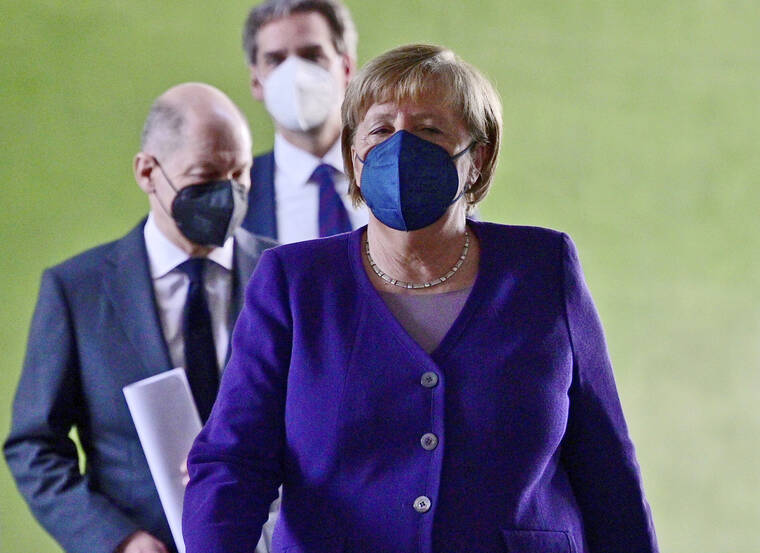Germany locks unvaccinated people out of public life; Mandate looms
[ad_1]
BERLIN >> Unvaccinated people all over Germany will soon be excluded from non-essential shops, restaurants as well as sports and cultural venues, announced Chancellor Angela Merkel today, and Parliament will consider a general vaccination mandate as part of efforts to contain coronavirus infections.
Merkel announced the measures after a meeting with federal and state leaders when the country again exceeded 70,000 newly confirmed cases within 24 hours. She said the steps were necessary to address concerns that hospitals could become overloaded with patients suffering from COVID-19 infections, which are much more likely in people who have not been vaccinated.
“The situation in our country is serious,” Merkel told reporters in Berlin and called the measures an “act of national solidarity”.
She said officials had also agreed on a nationwide mask requirement, new restrictions on private meetings and a goal of 30 million vaccinations by the end of the year – an effort that is reinforced by the fact that dentists and pharmacists can administer the vaccinations.
Merkel said authorities plan to vaccinate staff in hospitals and nursing homes against COVID-19, and she supported the even more controversial idea of ​​imposing a universal vaccination mandate. She said parliament would debate the proposal with input from the country’s national ethics committee. The mandate could come into force as early as February.
“In view of this situation, I really think it is necessary to pass such a mandate,” said Merkel, adding that she would have voted for it if she were still a legislator.
Months ago Merkel had indicated that a vaccination mandate would not be effective, but did not rule out the possibility.
Around 68.7% of the population in Germany are fully vaccinated, well below the federal government’s minimum target of 75%.
Austria, which recently imposed even stricter measures against unvaccinated people as part of a 20-day lockdown, is planning a vaccination mandate until February.
In Germany, unvaccinated people will still be able to meet privately, but only in a very limited number. A household with an unvaccinated person over the age of 14 can only meet with two people from another household; the limit does not apply if everyone is vaccinated.
There have been major protests against pandemic measures in Germany in the past, and the proposed vaccination mandate is likely to be rejected by some, although opinion polls show that most Germans are in favor.
Finance Minister Olaf Scholz, who is expected to be elected Chancellor by a center-left coalition next week, has also spoken out in favor of a general vaccination mandate, but he is in favor of letting the legislature vote according to his personal conscience and not according to party lines.
“If we had a higher vaccination rate, we wouldn’t be discussing it now,” he said.
The surge in COVID-19 cases in recent weeks and the introduction of the new variant of Omicron have warned scientists and doctors that if drastic measures are not taken, the country’s medical services could be overloaded in the coming weeks. Some hospitals in the south and east of the country have already moved patients to other parts of Germany due to a lack of intensive care beds.
The German disease control authority reported 73,209 newly confirmed cases today. The Robert Koch Institute also reported 388 new deaths from COVID-19, bringing the total since the pandemic started to 102,178.
The discussion about new measures is made more difficult by the political structure of Germany, which leaves the 16 federal states responsible for many regulations, and the ongoing transition between the old and the new government at federal level.
Scholz, whose Social Democrats narrowly defeated Merkel’s center-right union in September, defended the latest steps as a political compromise.
“We are reacting to the current situation with very far-reaching, very drastic, but precise measures,” he told reporters. “This is where a decision is made and, what is particularly important to me, a consensual approach.”
To reduce the pressure on hospitals, the sale of fireworks, which are traditionally set off on New Year’s Eve, is banned in Germany. Every year hospitals treat hundreds of people with serious injuries from improperly handled fireworks.
The new measures – which are considered a national minimum – will come into effect as soon as the 16 states are expected to incorporate them into existing rules in the coming days.
Merkel, who probably took part in her last press conference as Chancellor, made her displeasure about leaving office at a time when Germany has an infection rate of almost 440 new infections per week per 100,000 inhabitants.
“If we had an average incidence of 130, like in Italy, or 150, I would feel a lot better,” she said. “I want to be very clear.”
[ad_2]


Comments are closed.